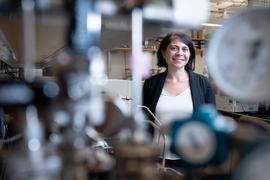Methane traps much more heat per pound than carbon dioxide, making it a powerful contributor to climate change. “In fact, methane emission removal is the fastest way that we can ensure immediate results for reduced global warming,” says Audrey Parker, a graduate student in the Department of Civil and Environmental Engineering.
Parker and other researchers in the Methane Emission Removal Project are developing a catalyst that can convert methane to carbon dioxide. They are working to set up systems that would reduce methane in the air at dairy farms, which are major emitters of the gas. Overall, agricultural practices and waste generation are responsible for about 28 percent of the world’s methane emissions.
“If we do our job really well, within the next five years, we will be able to reduce the operating temperature of this catalyst in a way that is net beneficial to the climate and potentially even economically incentivized for the farmer and for society,” says Desirée Plata, an associate professor of civil and environmental engineering who leads the Methane Emission Removal Project.
Video by Melanie Gonick/MIT News | 4 minutes, 35 seconds










